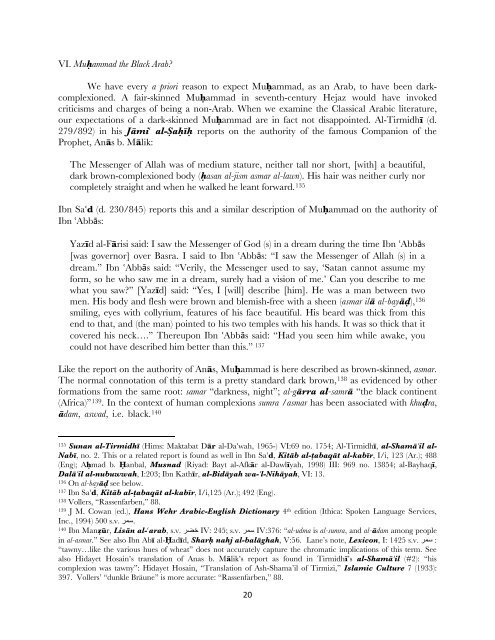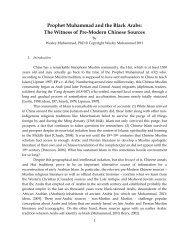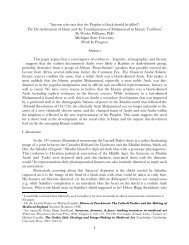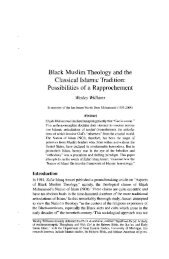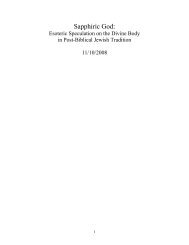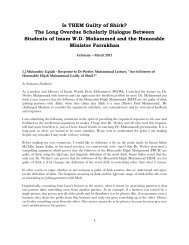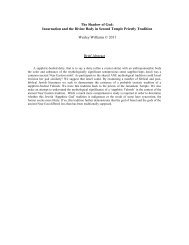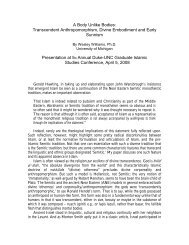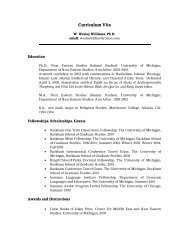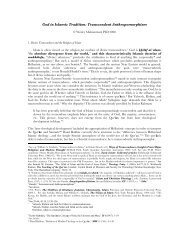“Anyone who says that the Prophet is black should be killed”: The ...
“Anyone who says that the Prophet is black should be killed”: The ...
“Anyone who says that the Prophet is black should be killed”: The ...
Create successful ePaper yourself
Turn your PDF publications into a flip-book with our unique Google optimized e-Paper software.
VI. MuÈammad <strong>the</strong> Black Arab?<br />
We have every a priori reason to expect MuÈammad, as an Arab, to have <strong>be</strong>en darkcomplexioned.<br />
A fair-skinned MuÈammad in seventh-century Hejaz would have invoked<br />
critic<strong>is</strong>ms and charges of <strong>be</strong>ing a non-Arab. When we examine <strong>the</strong> Classical Arabic literature,<br />
our expectations of a dark-skinned MuÈammad are in fact not d<strong>is</strong>appointed. Al-TirmidhÊ (d.<br />
279/892) in h<strong>is</strong> J§mi# al-‘aÈÊÈ reports on <strong>the</strong> authority of <strong>the</strong> famous Companion of <strong>the</strong><br />
<strong>Prophet</strong>, An§s b. M§lik:<br />
<strong>The</strong> Messenger of Allah was of medium stature, nei<strong>the</strong>r tall nor short, [with] a <strong>be</strong>autiful,<br />
dark brown-complexioned body (Èasan al-j<strong>is</strong>m asmar al-lawn). H<strong>is</strong> hair was nei<strong>the</strong>r curly nor<br />
completely straight and when he walked he leant forward. 135<br />
Ibn Sa#d (d. 230/845) reports th<strong>is</strong> and a similar description of MuÈammad on <strong>the</strong> authority of<br />
Ibn #Abbās:<br />
YazÊd al-F§r<strong>is</strong>i said: I saw <strong>the</strong> Messenger of God (s) in a dream during <strong>the</strong> time Ibn #Abbās<br />
[was governor] over Basra. I said to Ibn #Abbās: “I saw <strong>the</strong> Messenger of Allah (s) in a<br />
dream.” Ibn #Abbās said: “Verily, <strong>the</strong> Messenger used to say, ‘Satan cannot assume my<br />
form, so he <strong>who</strong> saw me in a dream, surely had a v<strong>is</strong>ion of me.’ Can you descri<strong>be</strong> to me<br />
what you saw?” [YazÊd] said: “Yes, I [will] descri<strong>be</strong> [him]. He was a man <strong>be</strong>tween two<br />
men. H<strong>is</strong> body and flesh were brown and blem<strong>is</strong>h-free with a sheen (asmar il§ al-bay§∙),<br />
smiling, eyes with collyrium, features of h<strong>is</strong> face <strong>be</strong>autiful. H<strong>is</strong> <strong>be</strong>ard was thick from th<strong>is</strong><br />
end to <strong>that</strong>, and (<strong>the</strong> man) pointed to h<strong>is</strong> two temples with h<strong>is</strong> hands. It was so thick <strong>that</strong> it<br />
covered h<strong>is</strong> neck….” <strong>The</strong>reupon Ibn #Abbās said: “Had you seen him while awake, you<br />
could not have descri<strong>be</strong>d him <strong>be</strong>tter than th<strong>is</strong>.” 137<br />
Like <strong>the</strong> report on <strong>the</strong> authority of An§s, MuÈammad <strong>is</strong> here descri<strong>be</strong>d as brown-skinned, asmar.<br />
<strong>The</strong> normal connotation of th<strong>is</strong> term <strong>is</strong> a pretty standard dark brown, 138 as evidenced by o<strong>the</strong>r<br />
formations from <strong>the</strong> same root: samar “darkness, night”; al-g§rra al-samr§ “<strong>the</strong> <strong>black</strong> continent<br />
(Africa)” 139 . In <strong>the</strong> context of human complexions sumra /asmar has <strong>be</strong>en associated with khu∙ra,<br />
§dam, aswad, i.e. <strong>black</strong>. 140<br />
135 Sunan al-TirmidhÊ (Hims: Maktabat D§r al-Da#wah, 1965-) VI:69 no. 1754; Al-TirmidhÊ, al-Sham§"il al-<br />
NabÊ, no. 2. Th<strong>is</strong> or a related report <strong>is</strong> found as well in Ibn Sa#d, Kit§b al-ãabaq§t al-kabÊr, I/i, 123 (Ar.); 488<br />
(Eng); AÈmad b. \anbal, Musnad (Riyad: Bayt al-Afk§r al-DawlÊyah, 1998) III: 969 no. 13854; al-BayhaqÊ,<br />
Dal§"il al-nubuwwah, I:203; Ibn KathÊr, al-Bid§yah wa-"l-Nih§yah, VI: 13.<br />
136 On al-bay§∙ see <strong>be</strong>low.<br />
137 Ibn Sa#d, Kit§b al-ãabaq§t al-kabÊr, I/i,125 (Ar.); 492 (Eng).<br />
138 Vollers, “Rassenfar<strong>be</strong>n,” 88.<br />
139 J M. Cowan (ed.), Hans Wehr Arabic-Engl<strong>is</strong>h Dictionary 4 th edition (Ithica: Spoken Language Services,<br />
Inc., 1994) 500 s.v. ﺮﻤﺳ.<br />
140 Ibn Maníår, L<strong>is</strong>§n al-#arab, s.v. ﺮﻀﺧ IV: 245; s.v. ﺮﻤﺳ IV:376: “al-udma <strong>is</strong> al-sumra, and al-§dam among people<br />
in al-asmar.” See also Ibn AbÊ al-\adÊd, SharÈ nahj al-bal§ghah, V:56. Lane’s note, Lexicon, I: 1425 s.v. ﺮﻤﺳ :<br />
“tawny…like <strong>the</strong> various hues of wheat” does not accurately capture <strong>the</strong> chromatic implications of th<strong>is</strong> term. See<br />
also Hidayet Hosain’s translation of Anas b. M§lik’s report as found in TirmidhÊ’s al-Sham§"il (#2): “h<strong>is</strong><br />
complexion was tawny”: Hidayet Hosain, “Translation of Ash-Shama’il of Tirmizi,” Islamic Culture 7 (1933):<br />
397. Vollers’ “dunkle Bräune” <strong>is</strong> more accurate: “Rassenfar<strong>be</strong>n,” 88.<br />
20<br />
136


